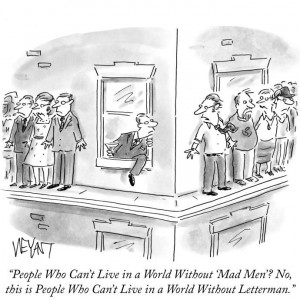 image courtesy Matthew Weiner and AMC
image courtesy Matthew Weiner and AMC
Well, so many people have been mourning the end of the series Mad Men over the last few days. (Not to mention the end of David Letterman.)
Well, actually, many have been in mourning since the end of the show was announced in 2013. And, perhaps herein lies the problem, or should I say an illustration of the “Mad Men effect”. That would be “our” so-typical propensity to over-bemoan, expand, drag-out, merchandize, wring dry, and, dilute to the point where we have left a perfectly good concept in ruins. I hate to say it but it has the hallmark of “so American-Marketing model” written all over it, what used to be known as “so Madison Avenue”. What we all learned, quite boringly in Marketing 101 is now on more steroids than my poor cat Callie. Truth? Picture a new cartoon of people thinking of jumping, all spoiled by the ubiquitous and indiscriminate overuse of the term, Farm-to-Table.
I read with great interest this morning the article in June’s Vanity Fair Magazine by Corby Kummer, entitled, “Time to Table Farm-to Table”. His piece, I believe was intended to showcase how a great concept can be brilliant and destructive at the very same time. The moral of his story is that Farm-to-Table, while once upon a time so well-intended, became such a cliché that it supplanted the drive for chefs to create just plain great food, and hence, as a label, should be taken “off the table”, out of the picture. I feel that a few comments are in order in response to this opinion piece.
Perhaps I read this article with a tinge of defensiveness. Perhaps, we are even attempting to say the same thing. But, while I think I got his message, I can’t help but feel like some lines of demarkation were lost somewhere. I believe he failed to effectively distinguish between the movement, Farm-to-Table and the rabid absorption of the term into the world of “marketing”. Here he left me with a need to clearly distinguish between the relative taste for each… and hence illustrated perfectly, the Mad Men effect. (did “they” not more than a bit naively endeavor to promote all those cigarette brands to us throughout our parents’ lifetimes? – ok, I’m holding back here) At the very least, I found no enduring defense of the concept, Farm-to-Table, that went beyond, its obvious own spoiling…….. (food puns intended). His conclusion, as the title implies, is to call for tabling Farm-to-Table. I couldn’t disagree more.
There are two very separate and important concepts being discussed here – one valid and defensible, the other not so much. The defendable one would be all the benefits of the concept in its original intent – that is, as Alice intended – in the procurement process, the transparency and the “knowing of the people parts”. The other would be what I will sadly, double back and call “The Kardashian effect” or, as Kris K would say, the development of a “brand” – the over-use and over-kill of a concept, metastasized, if you will, one which, in its own explosion is bound for its own demise. And, let’s just tell it like it really is. It wouldn’t be the first time that in America, we completely blasphemed a perfectly good and noble cause, all in the name of “marketing genius”, and I use the term, “genius” of course, completely tongue-in-cheek.
The first, the objective of procuring food, meat, fish, vegetables and fruit, nuts, and herbs, etal from responsible suppliers, is indeed a noble and supportable and enduringly desirable cause. There is nothing wrong with this objective and the term “Farm-to-Table” will hopefully survive its bastardization and continue to be used in the promotion of this goal. Small farmers as well as consumers have gained much from this movement – the young and idealistic, motivated, dedicated and earnest entrepreneurs have been drawn into the farming business as the wonderful new blood and supply options so dearly needed to have as an example in integrity – not to mention as a nod to the countries that continue to do this easily, well and without blaspheme. The competition that supermarkets have gotten from farmer’s markets across the country is a good thing. Knowing your Farmer is also a good thing. Knowing how he/she grows and raises what they sell is important and will hopefully continue to help clean up the general food supply. Not to mention that the transparency is as desirable as it would be in, let’s say, um, the federal government.
The tenets behind the farm-to-table movement were and remain valid and highly defendable. The point lost on me was how we veered off the road, crossed the line of demarkation and the marketers began to “use” the phase, without regard to the tenets, and applied them in the marketing function in the restaurant business model and every other possible iteration imaginable. The Mad Men also went awry when they assumed that we needed instruction, in detail, ad-nauseaum, when we were trying to just have a nice dinner. I believe they learned this recently at a few of the most revered restaurants in New York.
I hope for Alice’s sake and for ours, that Farm-to-Table will continue to be regarded as a solidly defendable value system in the food chain and very useful in the defense against large corporate food conglomerates whose mission is to promote marginal at best, if not horrible food options. (I actually saw a commercial this afternoon for a 150 calorie breakfast for a teenager to thrive upon – I don’t know any growing adolescent or teen that can thrive on 150 calories of puffed rice and a thrown in dehydrated strawberry, sorry – but, I digress). And don’t even get me started on Monsanto who is now inviting us into “the discussion”.
I believe Mr. Kummer is trying to make this point but the message gets lost in his distressing over how restauranteurs have adopted this as a marketing tool, purely in their own best interest, and where he seems to be implying that food quality has suffered – does he mean as a result or just coincidentally?
What I believe Mr. Kummer is trying to say is that the marketing instinct in people, be they hired hands or the restauranteurs themselves, got ahold of the term and not only wore it out, but diluted, massaged, and wrangled it to death, right up to the point of total ruin and therefore making it meaningless at best and dysfunctional at worst. Again, not the first time that American business has overused and destroyed a perfectly good use of words. Yes, the Kardashianism of the term, Farm-to-Table came in when every level of the subsequent food chain adopted the phraseology in an effort to help sales, image and therefore profits. So sad.
Where I get a little hot around the collar is where he is suggesting that we table Farm-to-Table and get back to the goal of creating great food. Here is where again I think things get cloudy in the article if not more than a tad insulting.
As every Alice Waters fan knows, she is always about great food and where it comes from. I don’t believe it is in her to deviate from this. Celebrating great food is an outflow from her tenet. And, I believe there are countless chefs that endeavor to put out great food daily, regardless of whether you call it Farm-to-Table or not. The fact that other marketers, from the litany of restaurateurs he mentions to McDonalds have bastardized the idea is and should remain, another issue, for we surely know that there is no Farm-to-Table cuisine at McDonalds.
Perhaps what is really important is to examine the American marketing model in general. Like in Mad Men, there is an entire industry devoted to merchandising any spec of a good idea into something noteworthy and MONEYMAKING, without a smidgeon of regard to intrinsic value. We have no idea how or when to stop ourselves before the law of diminishing returns sets in. Can’t we ever stop ourselves from ruining it?
Here is the bottom line for me – the enduring integrity of Farm-to-Table: How terribly sad to have this marketer’s tag-line applied to those people who really love the “art of food”. Ut-oh – Here, you can call me a food snob all day long. But, I can tell you that coming from the very humblest of home cooks born of the immigrant experience, my family reveled in the bringing in of a colander of fresh picked green beans and the day’s ripe tomatoes. I have witnessed with my own eyes the backing up of a dump truck into our driveway by my Mom’s “Uncle Tony”, to deliver with pride, from his own collection of bushel baskets, an armful-sized bundle of the most fragrant fresh basil, ears of corn, lettuces, peppers and eggplants, etal to my Mom for her pleasure. The pride on his face was undeniable and this photo hardwired into my brain forever. This to me, is enduring and the essence of Alice’s movement on a micro-scale, and mirrors what I see on the faces of those farmers who vend at my local and not-so-local farmer’s markets. No one can ever take this away from these hardworking people. They, I hope, can sleep at night. Their marketing is ok with me, on every level.
Sadly, we do indeed have the propensity to overuse, dilute and market to the death here in America. And, if you listen to CNBC all day in the car as I do, you might just be left, as I am, with a bad taste in my mouth – as I hear discussions, aka celebrations, of forecasted profit numbers of big pharma’s sales of drugs in every possible malady imaginable by man – (aka wait, are we celebrating that people are sick and we can make money from it?) – but that is another story for another day.
Suffice it to say that in Europe, and many cultures and countries like Italy and Alice’s beloved France, Farm-to-Table has existed, as she well learned, for generations, quietly, creatively, cleanly and unceremoniously for generation upon generation. It is a way of life, with its very own integrity, and it is certainly not a marketing stunt. Why should we relinquish what remains valid? And so, for me, what should be tabled only, is the superfluous use of the term in the marketing process.
